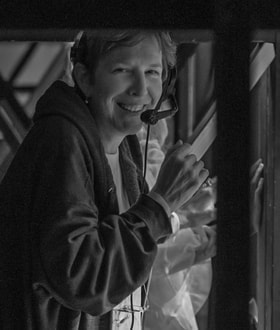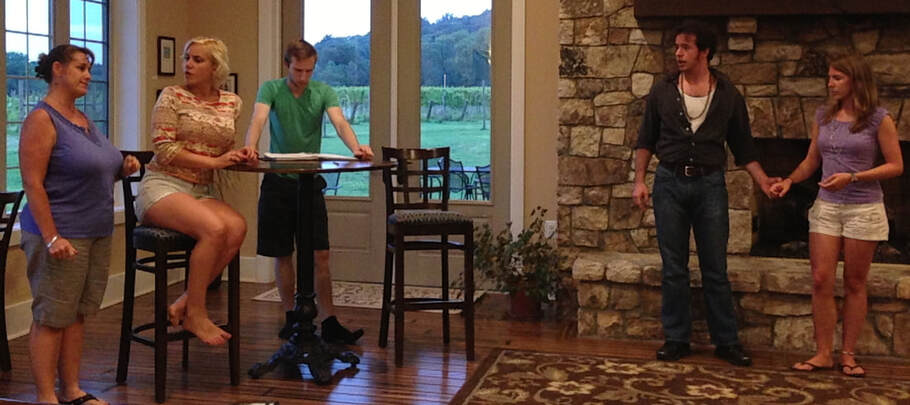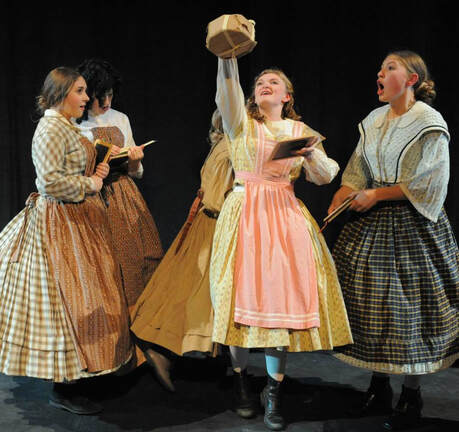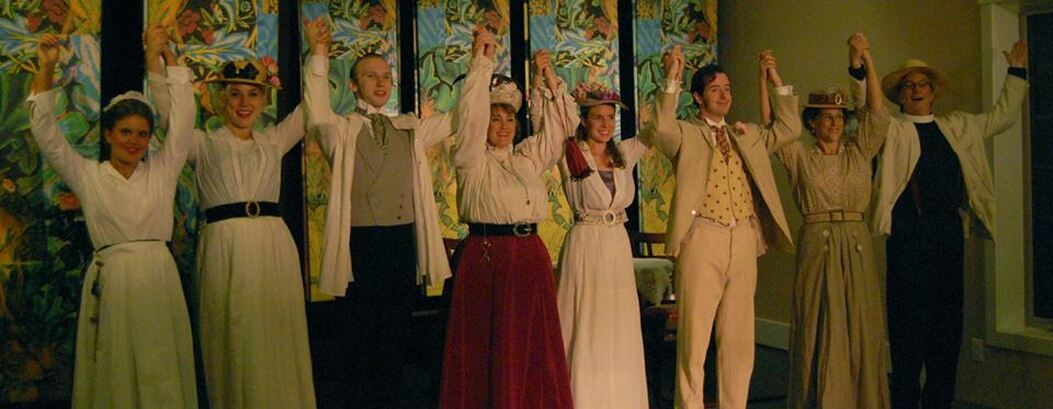 "You may have people in your life who don't expect much from you — don't value your potential or input — for whatever reason: too young, too old, too inexperienced? I am not one of those people." If you’re an actor who’s been in one of my theatre productions, you've heard me say something like the above... on the very first day. And as rehearsals progress, you've probably also heard my favorite mantra: "That was perfect! Now do it again." When I direct, I tend to treat young actors like they’re adults and all actors like they're professionals - each one of them with opinions and ideas that matter. And if all goes well, by the end of a production the actors own the show as much as I will... because that's when the magic happens.  These are some of the best actors I've ever had the pleasure to work with, each an expert in character development. L to R: Sue Derrow, Maddy Curtis Vencil, Garrett Milich, Christopher Saunders and Suzy Alden rehearsing a production of Oscar Wilde's IMPORTANCE OF BEING EARNEST. Photo by Craig Thoburn. I learned how to direct while running a non-profit theatre company for 10 years and producing 30-some shows. Some directors held BA's in theatre, some held Masters and others worked by the seat of their pants. And I? I received my education watching all of them. Some wanted actors to do exactly what they told them to do... which is fine if a director is brilliant and creative and can get actors to actually DO exactly what they say (But if the director is not, well...). Others expected actors to memorize lines at home and spend most of their rehearsals doing "acting exercises". And if the actors were able to fight the boredom, they''d make it to Opening Night. Some directors use a style professional directors use: they think all their work is done in casting and expect the actors to show up with their lines memorized - ready to go! But this only works in professional theatre. And then there were the three directors I studied intensely - the best of the best: Dolly Stevens, Tim Jon and Tom Sweitzer. All three would begin with respect for the actor and end with actor ownership of their role/s, and I cannot direct any other way. After 10 years of learning, it was time for me to direct. I took the company I'd used to produce history documentaries and public programs for museums and started producing and directing local theatre. BUILDING A PLAY ONE CHARACTER AT A TIME So, about those professional actors who just show up ready? Yes. I want actors to internalize the process like professional actors do - with things they would have learned in drama school. So I'll start them off with the my Director's character concept, but then ask them to read the script and make that character their own. I encourage full character development, even if they have no lines or are a member of the Chorus. And I like some exercises done at home, because they desperately need time to build the scenes on their own... then together. The main reason I like doing acting exercises in rehearsal is simply to let the actors get to know each other and respond to their various characterizations. As we go along, I'll teach Method Acting, which involves improvisation and emotional recall, and then go over how they might best learn a script: audio, visual or movement - whatever helps them get where they need to be. And as rehearsals progress, I'll start soliciting their ideas. And if their idea serves to: 1. Further the plot, 2. Reveal more about their character, or 3. Set the audience up for a pay off (in this scene or a later one), then I’m going to try to work it in. When actors of any age approach a play this way, they start finding relationships and possibilities that as director I might have missed. And I will always want to be open to their idea, because amazing things might come of it. BE WILLING TO KILL YOUR FABULOUS IDEAS When I became a published author years ago, I had to defend my choices to an editor - based on the same three rules above. So what if I spent five hours crafting that paragraph, or thought I had the most clever conversation going? If it doesn’t develop a character or relationship, further the plot, or provide a payoff, I had to be willing to let it die. Note: clearly this requires the director to know the play inside and out, because if you haven't prepared yourself, you're going to get defensive. Add a really tiny ego, and you just... might... SNAP. So in my directing world, I have to come in prepared and confident... but also realize I might not have the best ideas in the room. Yes, I know I have a creative brain, but why wouldn’t I tap into a larger creative brain if I had the chance? Actors have more time to dive into these characters. Give them the space, and they're going to find things there I didn't see. And as all the actors do the same, relationships and situations things are going to happen - good things: "If she's going to react that way because of what happened earlier, as her sister I would know that, and that completely changes the way I should react..." Above: the stellar cast of Run Rabbit Run Theatre's TAMING OF THE SHREW And, as a result of all of the above, actors begin to take ownership - of their characters, a scene and the play itself. And this is where the magic begins. So even though this will replace the absolutely brilliant idea I had as the Director, well... gulp... let's do this instead. And the audience will thank you for it... literally. BUT WHAT ABOUT THE REALLY BAD IDEAS? Okay. What if your actor comes up with an idea that just won’t work? Is truly horrible? Makes no sense to the character's history, etc.? And they present it to everyone before I've heard it? Then I have to thank them for the idea, say No, and tell them why. Why? Because 1. I want them to know suggestions are respected and appreciated, and the next one they have may be perfect (and often are), 2. Explaining why it won't work helps everyone understand more about the character, the plot or the scene mentioned, and 3. An explanation gives everyone in the cast a chance to further understand the setting, the character or the plot of the whole thing. Obviously at this point a couple of things are crucial: a directors needs to love their actors enough to know how to say no diplomatically or actors won't offer ideas for fear of retribution. But directors also need to avoid wanting actors to loooove them, or they'll never know how to say no to a bad idea, and the whole cast and the whole play will suffer. But, in the end, whether a good idea or a bad one, thanks are due to actors. Because their process and commitment is how a good play becomes great. ACTORS' INSIGHTS WITH PHIL ERICKSON AND PENNY HAUFFE - 4-minute Video (Click!) LAY DOWN THE GROUND RULES Lest you think rehearsals should devolve into a free-for-all “sharing time,” I'll point out ideas are solicited only at certain times in the process: 1. Creative input falls mostly in the beginning of the rehearsal schedule. Group discussion is good. And this is also a great time for the Director to underscore the story arc of the play, the scenes, and the characters. 2. Then when we begin to run scenes regularly, actors are asked to hold their ideas until the next break - and then share those ideas only with the director. 3. Crucial to the entire process: actors do not get to suggest what other actors can do. Ever. They can certainly ask why another character does something, but... that's it. Simple reason: every actor must be entirely focused on their own character/s, their actions, feelings, backgrounds, etc.. This is the process professional actors use, and I love bringing it to community theatre, because, when actors take this process on, shows get reviews worthy of professional productions (Think I'm lying? Check out Run Rabbit Run Theatre reviews). And when an actor is completely focused on developing their character in a scene, it often leads another actor to have a revelation about their own character. Lastly - without exception - an actor should never simply tell another actor to “do it this way" or "try it this way". Why? Well, because that would be called directing.
0 Comments
Leave a Reply. |



